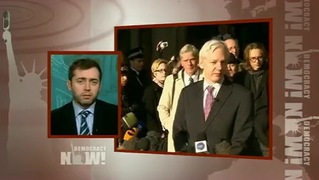
Guests
- Julian Assangeeditor-in-chief of WikiLeaks.org.
- Slavoj ŽižekSlovenian philosopher, psychoanalyst and cultural theorist. He is author of dozens of books. His latest is called Living in the End Times.
Links
- Watch WikiLeaks Editor-in-Chief Julian Assange interviewed on Democracy Now!
- See Democracy Now! interviews with Slavoj Žižek
- Democracy Now!’s Vast Archive of Reports on WikiLeaks and the Classified Documents They Released
- Watch the complete 2-hour discussion with WikiLeaks Founder Julian Assange, Slavoj Žižek and Amy Goodman
During a July 2 discussion in London moderated by Democracy Now!’s Amy Goodman, WikiLeaks founder Julian Assange discusses a new lawsuit WikiLeaks is filing against Visa and MasterCard for what he calls an “economic blockade” against his whistleblower group, preventing them from collecting credit card donations online. Mastercard, Visa and other financial giants cut off payment methods to WikiLeaks following the release of secret U.S. diplomatic cables last year. “It is an extraordinary thing that we have seen, that Visa, MasterCard [and other companies] are instruments of U.S. foreign policy,” Assange says. [includes rush transcript]
Transcript
AMY GOODMAN: We return now to our conversation with WikiLeaks editor-in-chief Julian Assange and the Slovenian Philosopher Slavoj Žižek. These next highlights feature Assange. Again, 1,800 people gathered this Saturday for this unusual discussion, moderated by Democracy Now!, about the impact of WikiLeaks on world politics, the release of the Iraq and Afghanistan War Logs, and Cablegate, the largest trove of State Department documents released in history.
I asked Julian Assange about WikiLeaks’ anouncement that it’s filing suit against credit card companies Visa and MasterCard.
JULIAN ASSANGE: You know, when Daniel Ellsberg released the Pentagon Papers—actually, I spoke to Daniel Ellsberg last night. He told me an incredible story about that. But did you know the New York Times had a thousand pages of the Pentagon Papers one month before Daniel Ellsberg gave the Pentagon Papers to the New York Times? Fresh news. Amazing stuff. Yeah, I’ll leave that aside.
Sorry, what was the question? Oh, yes, MasterCard. So, when Daniel Ellsberg released the Pentagon Papers, did they suddenly change things? Actually, Nixon was reelected after Daniel Ellsberg released the Pentagon Papers. The Vietnam War didn’t stop. The information was very important in all sorts of ways, and its importance over time was very important.
The most important thing to come out of the Pentagon Papers was the reaction to the Pentagon Papers, because the Pentagon Papers described a situation in the past, what the past was like, but the reaction to the Pentagon Papers described what was going on right now, and it showed a tremendous overreach by the Nixon administration, various attempts to cover things up. And actually, the New York Times really probably wouldn’t have published the Pentagon Papers unless they thought it was going to be published anyway, which they did. It was scheduled to be published in four months’ time in a book. Very, very interesting.
So, on December 6th last year, Visa, MasterCard, PayPal, the Bank of America, Western Union all ganged up together to engage in an economic blockade against WikiLeaks, and that economic blockade has continued since that point. So, it’s over six months now we have been suffering from an extrajudicial economic blockade that has occurred without any process whatsoever. In fact, the only two formal investigations into this, one was on January 13 last year by Timothy C. Geithner, the Secretary of the Treasury, who found that there was no lawful excuse to conduct an economic blockade against WikiLeaks, and the other was by a Visa subsidiary, who was handling our European payments, Teller, who found that we were not in breach of any of Visa’s bylines or regulations. Those are the only two formal inquiries. And yet, the blockade continues. It’s an extraordinary thing, that we have seen that Visa, MasterCard, Western Union, and so on, are instruments of U.S. foreign policy, but instruments of U.S.—of not U.S., as in a state operating under laws foreign policy, but rather instruments of Washington’s patronage network policy. So there was no due process at all.
And so, over the past few months—you know, we have a number of cases on, so we have been a bit distracted. But over the last few months, we have built up the case against Visa and MasterCard, under European law. And Visa and MasterCard together own about 95 percent of the credit card payment industry in Europe, and therefore they have a sort of market dominance, and that means, under European law, they cannot engage in certain actions to unfairly remove people from the market.













Media Options